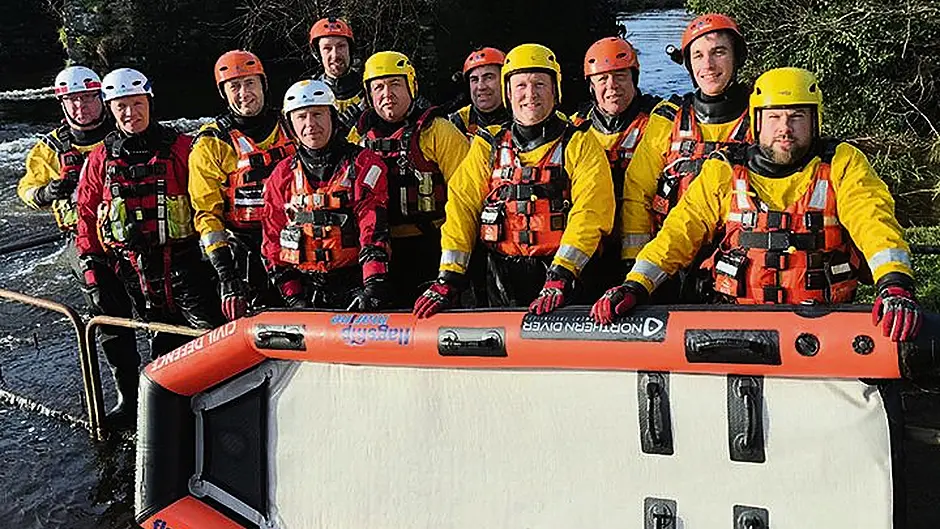Civil Defence volunteers from across West Cork are constantly training and upgrading their skills, as Brian Moore found out when he tagged along on a recent swiftwater responder course
Civil Defence volunteers from across West Cork are constantly training and upgrading their skills, as Brian Moore found out when he tagged along on a recent swiftwater responder course
WEST Cork has never been short of community spirit, and when it comes to providing an effective emergency search and rescue team along with invaluable community support in times of crisis, the local Cork West Civil Defence is always ready to respond.
Recently, The Southern Star was invited to spend the day with some of the local Civil Defence volunteers as they underwent their Swiftwater Responder Team training on the River Ilen, just outside Skibbereen. Onsite was Niall Twomey, Area Civil Defence Officer for West Cork, who outlined just what the volunteers are trained to do:
‘All our volunteers are from the local area and very much part of the local community. We train to respond to any emergency where we can assist, for example, the gardaí, the fire and ambulance service or the Coast Guard. All our members are trained in First Aid, Search Response, Flood Response, Communications, Boat Handling, Drone Operations and Radiation Monitoring.’
On the Saturday in question, the volunteers were on day one of a two-day Swiftwater Responder Team exercise where members practised how to operate in conditions where a river was in flood and fast moving.
‘Today it’s all about making sure that the teams can respond to any flood or river emergency where the river is in flood and fast moving,’ instructor Des Quinn said. ‘The aim is to ensure that everyone is familiar with the environment and the risks involved with, for example, rescuing or recovering a casualty from river.’
With the River Ilen in flood and the water rushing by at a tremendous speed, the Civil Defence volunteers went about practising the various procedures they would need to implement
in such an emergency.
‘We are working as a team to practise rescuing someone who has fallen into the river for example,’ Des explained. ‘Here, we also familiarise ourselves with what to do if one of the team members finds themselves in fast-flowing water and loses their footing for example.’
All equipped with hi-tech dry suits and wearing the very best flotation gear, the team members took turns plunging into the ice-cold water and being swept away by the force of the rushing river. The teams concentrated on knowing the way a river runs and where was a good place to start swimming.
‘There’s no point in trying to swim against the fast-flowing water,’ Des said as another volunteer stepped into the flow and headed off downstream at a rate of knots. ‘It’s called “defensive swimming”,’ he continued. ‘You head off, feet first, down the river and while the force of the water is pushing you on, there will be a natural eddy where the water will lose the force and speed and the idea is to spot this and guide yourself toward this area with your hands.’
Once the volunteer enters the eddy it is time to start ‘offensive swimming’ towards the shore.
The Civil Defence team is made up of volunteers from all walks of life. Across the country teams are made up of fire service personnel, trained paramedics and experienced lifeguards, as well as farmers, accountants, teachers, plumbers, and dedicated people from all sectors of society.
‘Civil Defence units have, in turn, trained search managers and response teams,’ Niall said. ‘We have a wide variety of specialist equipment including 4x4 vehicles, boats, command vehicles, drones and mapping systems to support the Gardaí in searches for missing persons for example. During severe weather and flooding events Civil Defence provides swiftwater responder teams, rescue sleds, flood pumps, pontoons and vehicles to support local authorities. We also provide critical information and situation reports to emergency coordination centres at national level.’
There are currently 50 active members in Cork West Civil Defence. The volunteers are always updating and honing their skills at the training centres in Skibbereen and Ballineen.
The Cork West Civil Defence is ready to respond to any call from the local authority, or the emergency services and they also regularly conducted training exercises and workshops with other agencies to ensure a co-ordinated response to call-outs, duties and operations.
‘For anyone interested in joining the Cork West Civil Defence team, we would love to hear from you,’ Niall concluded.
• For more information on all aspects of the organisation log on to www.civildefence.ie.
Offensive v defensive
‘Defensive’ swimming is also referred to as ‘body surfing’ and involves floating downstream in a protected position – lying on your back, feet downstream, arms out to the side and with your whole body floating as close to the surface as possible.
This is the best swimming position to assume if your goal is to ride out a rapid, or if you’re in shallow water and worried about hitting rocks.
‘Offensive’ swimming involves getting on your stomach and swimming hard with the front crawl technique. You swim aggressively to get to shore in deep enough water, cross eddy lines and to stay afloat in boils or whirlpools.









